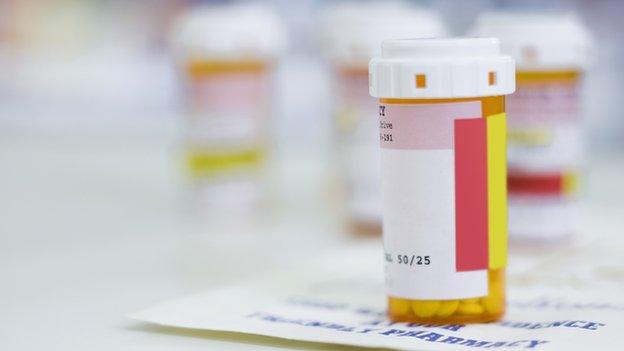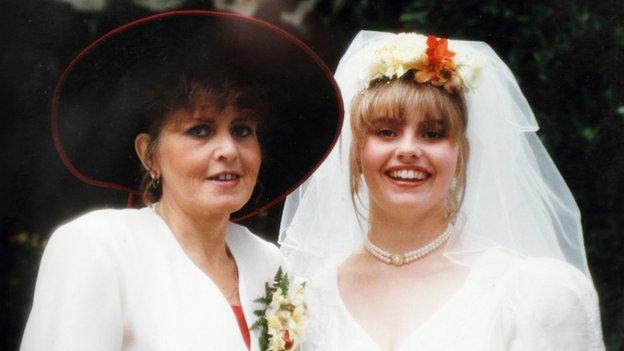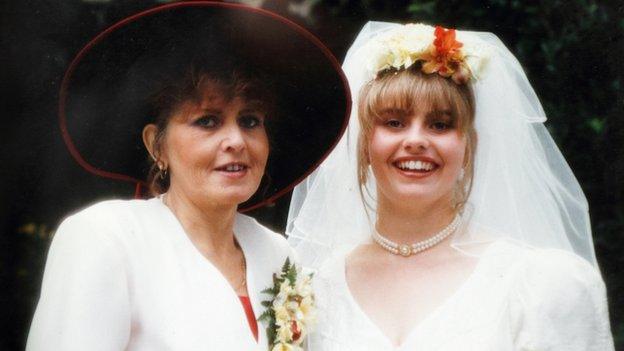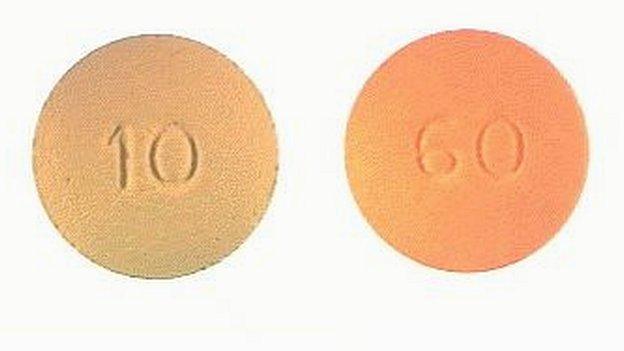New pharmacy rules 'should reduce dispensing mistakes'
- Published

Seven patient deaths have been linked to mistakes made by high street chemists since 2009
Health ministers want to introduce an airline-style error reporting system for the UK's high street pharmacies.
The government hopes it will provide more accurate information about the number of mistakes being made.
Voluntary reporting by pharmacists shows 10,000 medication errors a year, out of a billion prescriptions issued.
But academic research suggests that a quarter of a million patients are given the wrong medicine every year, with a million more so-called "near misses".
Seven patient deaths have been linked to high street chemists since 2009.
There are 36,750 high street or community pharmacists in the UK. According to support groups, an increasing number of them are feeling stressed due to the pressure of ever-rising numbers of prescriptions.
Under the Medicines' Act, pharmacists face criminal charges if they own up to making a mistake.
But under the system proposed by ministers, external, if they made a genuine mistake that harmed someone they would not face prosecution.
The Department of Health is currently considering a consultation about the proposed law change.
It said: "Encouraging pharmacists and their teams to come forward when they do make mistakes means that patients get better, safer care.
"Pharmacy professionals will learn from mistakes and prevent them from happening again.
"By decriminalising mistakes we will promote a more open culture of transparency."
Dawn Britton, a 62-year-old from Bristol, died in 2013 after going into a hypoglycaemic coma.

Tammy Haskins is angry that no one has been prosecuted for her mother Dawn Britton's death
She passed away weeks after her pharmacist wrongly dispensed diabetes drugs, instead of tablets for her Crohn's Disease.
Her daughter Tammy Haskins told the BBC 5 live Investigates programme there was no point changing the law as no one had faced prosecution in her mother's case.
"The CPS looked at it twice, and both times they said it was not in the public's interest to prosecute," she told the programme.
"I feel angry no one's accountable for my mother's death."
The last NHS report into pharmacy dispensing errors, published in 2007, external said that, in England and Wales, there were 113,953 "near misses" and 20,361 "dispensing errors."
These figures represent 0.1% (near misses), and 0.02% (dispensing errors) of all prescriptions issued.
But in the same year another study in the International Journal of Pharmacy Practice which looked at 11 UK community pharmacies put the error rate for prescriptions dispensed to be as high as 3%.
'Duty of care'
And voluntary reporting by pharmacists to the NHS under the current system shows only 10,000 medication mistakes a year, out of a billion prescriptions issued.
The Department for Health now wants to encourage candour by introducing a "no-fault" reporting system where blunders could be reported more freely.
But lawyers are sceptical that the changes would bring about significant improvements in safety.
Renu Daly from Neil Hudgell Solicitors represented Dawn Britton's family.
"These proposals will have a very limited impact on the protection of the public, or on ensuring the safe supply of medication is better regulated," she said.
"They will simply protect pharmacists from any kind of external scrutiny and accountability, and that would be a dangerous route to take."
According to the NHS National Reporting and Learning System, external, the vast majority of mistakes did not hurt anyone, but last year 1,200 people did suffer some harm because of a medication error.
In 2014 there were three deaths linked to community pharmacies. One of them was 83-year-old Edlie Masters.

Edlie Masters' family argues that pharmacists should face prosecution for serious mistakes
He died when a pharmacist delivered a blood pressure drug to his house instead of paracetamol.
His son Leon said the government should leave the law alone.
"If you don't have the threat of prosecution in place, it is giving pharmacists a right - 'if I do make a mistake, nothing is going to happen to me'," he explained.
"Accidents do happen, but they have a duty of care as well to you as a customer handing over prescriptions to you."
Learning lessons
But Ash Soni, president of the Royal Pharmaceutical Society, insists the proposed law change will improve patient safety.
"Pharmacists take the responsibility for the safe and correct supply of medicines to patients extremely seriously," he said.
"Sadly, mistakes occasionally happen and, when they do, we must be open with patients and do everything we can to stop them happening again.
"The proposed changes will increase accountability through greater reporting of errors and improve patient safety by sharing the learning from errors across the profession."
Pharmacist Support chief executive Diane Leicester-Hallam said that more and more pharmacists are coming to her organisation for help.
"Around three quarters of all calls to our stress helpline, Listening Friends, relate to work," she told the programme.
"Enquiries include pressures to meet targets, staffing levels and increasing numbers of prescriptions."
5 live Investigates is broadcast on BBC 5 live on Sunday 24 May at 11:00 BST. Listen to the programme or download the podcast.
- Published26 November 2014

- Published20 October 2014

- Published6 May 2014
